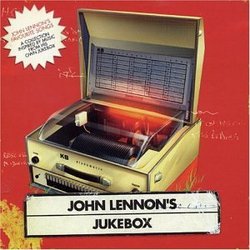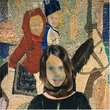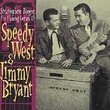| All Artists: Various Artists Title: John Lennon's Jukebox Members Wishing: 3 Total Copies: 0 Label: EMI Import Release Date: 3/15/2004 Album Type: Import Genres: Pop, R&B, Rock Styles: Motown, Soul, Oldies & Retro Number of Discs: 2 SwapaCD Credits: 2 UPCs: 724357755528, 766487210843 |
Search - Various Artists :: John Lennon's Jukebox
 | Various Artists John Lennon's Jukebox Genres: Pop, R&B, Rock
|
Larger Image |
CD DetailsSimilar CDs |
CD ReviewsJohn Lennons Jukebox? - Not exactly ed-woods | BROMHAM, BEDFORDSHIRE United Kingdom | 03/12/2004 (3 out of 5 stars) "Whilst this is a good album for anyone trying to identify with Lennon's musical influences don't expect the recordings to be those that would have been on this machine. The absence of a comprehensive set of sleeve notes is a real let down and is probably being saved for the book which is due for release later this year. However, for me, the biggest disappointment was to discover that the compilers have utilised recordings that were not available on 45 RPM singles at the time. (The only format that Lennon's portable jukebox played) For example 'Some Other Guy' is credited to The Big Three. There was only one version by them available at the time and that was issued on a 1963 Decca (UK) single. We know that it was the only version issued because according to the band they were not allowed to cut it again. The version included on the compilation CD should of course have been that by Richie Barrett for there is no doubt that Lennon loved this record. Once the compilers decided to use The Big Three they should at least have used their single release and not the somewhat obscure recording that is on CD 'B'. Another clear variation is Buddy Holly's 'Slipin' & Slidin'. The version included is an 'undubbed' recording and not the overdubbed version that was originally released on the 'Reminiscing' Album in 1963 and as the 'B' side of the UK Single 'What To Do' in March 1965. In my view this is the version that John Lennon would have had at his disposal for his Jukebox, not one that wasn't released until 1969 when the 'Giant' Album appeared. I also have my suspicions about the included version of 'Bad Boy' by Larry Williams and again I'm not sure that this is the original single release version but I don't know enough about this artist to tell. The absence of 'Boot-Leg' by Booker T & The MG's is a complete mystery and renders the album unnecessarily incomplete. This CD was a terrific idea and it is a shame that it has been spoiled by some clumsy track selection by the compilers. Having found the inaccuracies I know about I'm now nervous about trusting the other tracks." Somewhat fudged but still commendable Laurence Upton | Wilts, UK | 09/28/2004 (4 out of 5 stars) "When John Lennon fled the marital nest in 1968 to fulfill his destiny with Yoko Ono, he left behind many of his possessions (imagine...). One of these was his Swiss KB Discomatic portable jukebox, lovingly stocked over time by Lennon since he bought it in 1965 with 40 of his all-time favourite singles. It went into storage at his old home of Kenwood in Weybridge and was was subsequently bought in 1989 for just £2,500 by the late Bristol music promoter John Midwinter at Christie's Beatles memorabilia sale, and painstakingly restored. Its recent rediscovery inspired this double CD of its contents, which ranged from Gene Vincent and Little Richard in 1956, through lots of US rock and roll and rhythm and blues, including 3 of Larry Williams' Specialty recordings and 5 by the Miracles, up to the Lovin' Spoonful, whose Daydream, the sole item from 1966, is the most recent selection. As the final Beatles concert took place in August 1966 and he was no longer on the road, he had probably then found it unnecessary to re-stock the jukebox, hence the lack of other selections from 1966 to 1968, in contrast to a dozen from 1965, including Dylan's magnificent non-album single Positively Fourth Street. It is a predominantly male collection, with only one female singer represented, namely Fontella Bass, whose splendid Rescue Me is on the first disc, and, surprisingly, as far as we can tell, no girl groups, despite the Beatles having covered the Cookies, the Shirelles, the Marvelettes and others in the first half of their career. There are 41 jukebox selections, drawn from 35 singles (6 are B-sides). There is very little extra information on the disc, one side of the four-page booklet being devoted entirely to the perils of making illegal copies, so we aren't told what the other five singles were, although after some detective work I have found they included Booker T and the MGs' Boot-leg/Outrage (1965); Arthur Alexander's You Better Move On/A Shot Of Rhythm And Blues (1961); Richie Barrett's original Some Other Guy/Tricky Dicky (1962); and another Miracles single, Ain't It Baby/The Only One I Love (1961), where he seems to have favoured the flipside. He seems to have chosen singles with particularly strong B-sides, to derive maximum benefit from the limit of 40 records, and either side of any of the above would have been welcome inclusions. The presence of 6 B-sides reminds us that the selection has been drawn from a possible 80, not 40 titles. Whilst a concentration on topsides is undoubtedly the correct path on the part of the compilers it is worth remarking that other notable B-sides qualifying for inclusion include Fontella Bass' magnificent The Soul Of The Man, Otis Redding's take on Down In The Valley, Tommy Tucker's I Don't Want 'Cha, Jimmy McCracklin's I'm To Blame, Larry Williams' High School Dance, Bob Dylan's From A Buick 6, The Lovin' Spoonful's instrumental Night Owl Blues plus On The Road Again, The Animals' glorious For Miss Caulker and Donovan's defining Hey Gyp (Dig The Slowness). There is mention of the "fascinating tracklist" in "Lennon's own handwriting", but this is not included in the minimal artwork except in token extracts. A CD collection inspired by music from a jukebox raises a number of questions regarding authenticity. Presumably we don't object to the absence of the snap, pop, crackle and hiss of the original vinyl. All the singles would have played in mono, too, but 14 of the tracks here are in luxurious stereo mixes. Should this be the case? In my view, yes, since it presents the recordings in their best light sonically. Should they be the same recordings of the songs that were on the jukebox? Indubitably, yes, they must be. Unfortunately, there is a discrepancy between the liner information, which describe correctly the tracks that ought to be on the CD, and the tracks that actually are included, in at least three cases: Slippin' And Slidin' by Buddy Holly is not the version to be found on the UK B-side found on Lennon's jukebox, which had backing posthumously overdubbed by the Fireballs, but is actually the unadorned New York apartment demo that was unreleased at the time and has never been on a single. Some Other Guy is not the Big Three's Decca A-side from 1963 which John so admired and copied for the Beatles' Easy Beat session that same year. It is a much later stereo recording with a different line-up and a totally inferior arrangement, and entirely misrepresents his choice. It probably comes from the 1973 re-union album Resurrection. Particularly unfortunately, this is the only British selection apart from the Animals' Bring It On Home To Me and Donovan's Turquoise (in turn, the only British song). The Miracles' I've Been Good To You is not the 1961 A-side, but comes from their 1963 live album The Miracles On Stage. It was never on a single and so could not have been on his jukebox. Additionally, if we are nit-picking, Little Richard's Ooh! My Soul from 1958 is at least longer than the version on the British single (to be found on Ace's The Original British Hit Singles). This probably would have been the version that Lennon had, as the BBC Beatles version of the song, aired on Pop Go The Beatles in 1963, was even shorter. These serious slips impair an otherwise illustrative and entertaining collection that show Lennon's exemplary musical influences and inspirations, especially as the compilers clearly know what they should be and have made out that they are what they are not. If tracks could not be licensed, could they not have made some alternative selections from the jukebox rather than substituting incorrect versions? It's well worth having, but ultimately, a unique opportunity has been somewhat fudged. If the label are worried about illegal copies, perhaps they should be more concerned about the door left open for bootleggers to do a better job. However, despite these shortcomings we are still left with 38 excellent and influential selections from John Lennon's jukebox, which by association become a special part of our cultural recent history." Perhaps the Beatles Inspiration? rash67 | USA | 07/16/2004 (5 out of 5 stars) "I loved it.Purports to be the original songs discovered in John Lennon's small personal 45 RPM Jukebox, found with his own hand-written labels. Authentic or not, it's great rock music. The Beatles, even before they were Beatles, growing up, loved to listen to American Rock and Pop, especially R&B. Collected every American record they could get their hands on.
Listen to these 50's and 60's oldies and go back to the early Beatles and see where Lennon and McCartney got their ideas and energy! Great to hear these old songs, cleaned up and remixed to show their interior lines.Some were quite popular, to the point of being banal, in their time, others were relatively obscure. I am particularly attracted to the slowed-down Buddy Holly's "Slippin and Slidin", Tommy Tucker's "Hi Heel Sneakers", and Barrett Strong's funky version of "Money" (That's What I Want). Where else can you get all these great songs together? With good mixes? And by the way, "plagarism" mean copying the works of another and calling them your own. The Beatles never "plagarized" anything. They did cover songs by other artists, with attribution, as do most all real artists. Rock music today would be much better if new musicians learned play by covering the music of the masters before trying to make their own "statement"." |

 Track Listings (20) - Disc #1
Track Listings (20) - Disc #1

